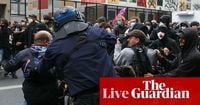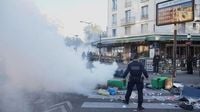On the morning of September 10, 2025, France awoke not to the usual bustle of commuters and city life, but to the acrid smell of smoke, the blare of police sirens, and the unmistakable energy of a nation on edge. All across Paris and in cities from Lyon to Marseille, protesters blocked highways, set blazes, and clashed with police in a sweeping display of frustration that quickly became one of the most disruptive days in recent French political memory.
This wasn’t a spontaneous outpouring, but the culmination of weeks of online organizing under the banner of “Bloquons Tout” — or “Block Everything.” According to France 24, the movement’s origins can be traced back to far-right online circles earlier in the summer, but it soon ballooned to encompass far-left, antifascist, anarchist groups, and eventually France’s powerful labor unions. The result? A leaderless, decentralized swell of anger that defied easy categorization and drew support from across the political spectrum.
The immediate spark for this nationwide upheaval was the collapse of Prime Minister François Bayrou’s government just two days earlier. Bayrou, who had championed deeply unpopular austerity measures — including slashing two national holidays, freezing pensions for 2026, and cutting billions from health spending — lost a parliamentary vote of no confidence on September 8. President Emmanuel Macron, facing a political vacuum, swiftly appointed Sébastien Lecornu, his fifth prime minister in less than two years, late on September 9. But the change at the top did little to quell the storm brewing on the streets.
By dawn on Wednesday, the scale of the protests was unmistakable. As reported by BBC and The New York Times, small groups of demonstrators began blocking bridges, roundabouts, and major roads across the country. In Paris, protesters attempted to barricade the city’s ring road, Europe’s busiest urban motorway, while others set rubbish bins ablaze at Porte de Montreuil and tried to obstruct tram tracks. Police quickly moved in, dismantling obstacles and dispersing crowds, but the cat-and-mouse game continued throughout the day. By 8:30 a.m., 75 protesters had already been taken into custody in Paris alone, and by midday, nationwide arrests had climbed to nearly 200, according to Interior Minister Bruno Retailleau.
Authorities had anticipated trouble. An extraordinary deployment of 80,000 police officers and gendarmes was ordered to guard against attempts to block essential infrastructure, including airports, public transport lines, power plants, and water treatment centers. “Law enforcement has the order to not tolerate any violence, any vandalism, any blockage, any occupation of our nation’s essential infrastructure,” Retailleau told reporters at a food market in Rungis, just outside Paris. Outgoing Interior Minister Retailleau also warned that “no blockade will be tolerated.”
Despite these warnings, the disruptions were widespread. In Rennes, a bus was set on fire. In the southwest, arson on a power cable halted train traffic between Toulouse and Auch. Entry to an Amazon depot in northern France was blocked, and about 715 disruptions were organized nationwide, as reported by NBC News. Barricades sprang up in Lyon, Marseille, and Toulouse, and hundreds gathered outside Paris’s Gare du Nord, one of Europe’s busiest train stations. Police closed access to the station and used tear gas to disperse protesters, but the crowds remained defiant. Chants of “Macron, demission” — “step down, Macron” — echoed through the air.
The movement’s anger was not limited to the government’s budget. Many protesters, like Marie, a student and actress who spoke with Euronews, voiced broader grievances: “I am protesting today because we are sick of it all. Today we are here to show Macron that we’re done with all of this. He can’t just keep ignoring us and what the people want.” For others, the issue was not just austerity, but a sense that the political class — the so-called ruling elite — had become hopelessly disconnected from ordinary people’s struggles. “We’re angry with the political system and the fact that the ultra-rich and corporations are not paying enough taxes,” university student Thomas told Euronews.
Healthcare and pharmacy workers joined the protests to oppose cuts to medical reimbursements, with unions warning that 6,000 of France’s 20,000 pharmacies could close. Two major unions, CGT and SUD, endorsed the day’s actions, with broader strikes already planned for September 18. The movement’s demands, according to leaflets circulated online, included strengthening public services, fighting media concentration, and taxing the rich — classic left-wing priorities, but with significant support from the far-right as well. An Ipsos poll cited by Euronews showed that 46% of French people supported the “Block Everything” movement, including more than half of far-right National Rally voters.
The protests’ decentralized nature made them hard to predict or control. As The New York Times noted, this was not a movement with official leaders or clear communication channels. “This movement is not centralized,” said Tristan Mendès France, a lecturer in digital literacy at Paris Cité University. “There are diffuse influences, including loads of extreme right influencers who have a large number of followers, but they are fragmented.” The atmosphere, he added, was one of “anger and frustration and dégagisme” — a wholesale rejection of France’s political class.
For President Macron, the crisis is a test of both his leadership and his ability to bridge France’s widening political divides. His decision to appoint Lecornu, a center-right ally and proven loyalist, was seen by critics as more of the same. Marine Tondelier, leader of France’s Green Party, called Lecornu’s appointment a “provocation” that revealed a “total lack of respect” for the French people. “What’s the point of voting?” she asked on BFMTV. Lecornu, for his part, promised during his handover ceremony to deliver “a profound break in substance, not just in form,” and pledged to meet with members from the biggest political parties to seek common ground.
Yet, as the day wore on, it became clear that the anger fueling the “Block Everything” movement ran deeper than any one politician or policy. The memory of the 2018 Yellow Vest protests, which also began online and led to months of unrest, loomed large. “Even if Macron doesn’t want it, here we are,” chanted protesters, echoing a slogan popularized during those earlier demonstrations.
By nightfall, the barricades were mostly cleared, the fires extinguished, and traffic had resumed in many places. But the sense of crisis remained. The leaderless, unpredictable movement had shown its power to disrupt — and its staying power in a country where political volatility and public protest are almost national traditions. Whether Macron and his new prime minister can address the root causes of this anger, or whether France is headed for more turbulence, remains an open question.



